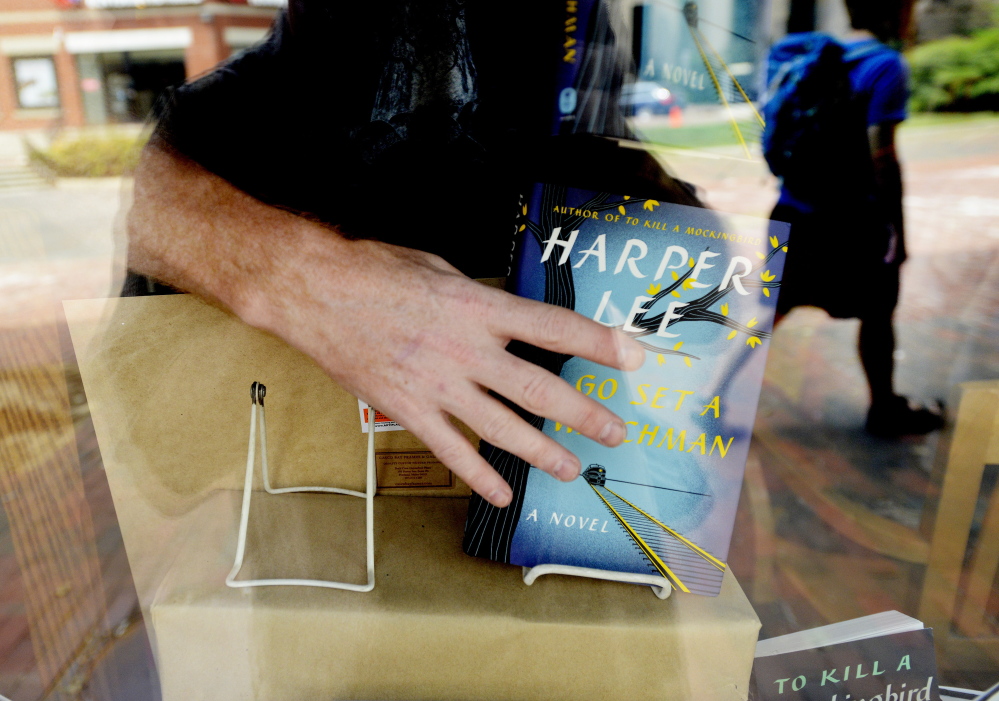Colby College English professor Cedric Bryant was still awaiting his pre-ordered copy of the new Harper Lee novel “Go Set a Watchman,” but he had read the first chapter online and enough news accounts to feel certain of one thing: Just as Lee’s “To Kill a Mockingbird” helped guide the national dialogue about race when it was published in 1960, “Go Set a Watchman,” published Tuesday, is certain to be part of the conversation about race in America today.
“What little we already know about this book confirms what is a truism about race in our culture, and what we keep learning and relearning, and that is that race matters. Race matters,” Bryant said.
“Go Set a Watchman” is set in the same rural South as “To Kill a Mockingbird” but 20 years later, in the 1950s. In the new book, the heroic lawyer Atticus Finch, who stood on moral high ground in his defense of a condemned black man in “Mockingbird,” is revealed as a bigot, warning about “Negroes by the carload in our schools, churches and theaters.”
This creates uneasy anticipation for a novel that fundamentally alters the character of a heroic figure in modern American literature, and forces us to reconsider our feelings for him. Retired Kennebunk High School teacher Joe Foster called Tuesday an “auspicious day” for literature, almost 55 years to the day after the publication of “To Kill A Mockingbird.”
Regardless how people feel about the book, it’s popular. Maine retailers reported an unusual level of presale interest and brisk sales Tuesday.
QUESTIONING A RACIAL TRANSFORMATION
Many have questioned Lee’s motive for releasing the novel now, and some wonder if she was coerced. Lee, who is 89, wrote it in 1957, three years before “Mockingbird.” Her editor sent it back for a rewrite, Lee changed the timing and the perspective of the characters, and that version became “To Kill a Mockingbird.” The novel remains an American classic, and the 1962 film based on the book is considered an all-time great, winning Gregory Peck an Oscar for his starring role as Finch. The book was instantly popular and won a Pulitzer Prize. Until Tuesday, it also was the only book from the reclusive Lee.
This week, her lawyer hinted that a third related manuscript may exist.
Bryant, who also lectures about race and multiculturalism, asked the question on the minds of millions of Americans when he heard about Finch’s racist views in the new novel: How is it possible that this paragon of morality and virtue and a beacon of racial justice could undergo such transformation in 20 years? Bryant will explore the question beginning with a spring Southern literature class at Colby, where he will teach “Go Set a Watchman” alongside “To Kill a Mockingbird.”
He suspects the answer lies in the psyche of the country, where race and racism have divided class and culture since Colonial days. “Go Set a Watchman” reminds us that what we saw as progress in “Mockingbird” – a man of character, standing on principle – may be nothing more than a moment in time when Finch acted nobly when the eyes of his neighbors were upon him.
Does “Watchman” portray his truer character, revealed in private moments when his hatred is embedded in his fear? It’s a disturbing story about one man’s journey that says more about our country and the filthy secret of slavery at the time of its founding than it does about any single author or pair of books.
Bryant believes the new novel will “resonate with our own contemporary moment if for no other reason than to suggest that racism has a long shelf life.”
“There is no expiration date for racism,” he said. “It is part of our collective conscience.”
MISGIVINGS, MILESTONE FOR LOCAL AUTHOR
Portland writer Genevieve Morgan is among those who was saddened by the news of a new Harper Lee novel. She doesn’t believe Lee wanted this book published. If she had, she would have done it years ago, Morgan said. The incident has led Morgan to “want to burn my manuscripts.”
That said, she was relieved to read the first chapter online. It was well-written and felt alive. It reminded her stylistically of “To Kill a Mockingbird.”
On Tuesday, Islandport Press released Morgan’s second book in her Five Stones Trilogy for young readers, “Chantarelle.” She enjoys boasting about sharing a release date with Lee, despite her misgivings about “Go Set a Watchman.”
Morgan discovered “To Kill a Mockingbird” during her teen years when she was learning about social justice and the potential for change in society. The book has been significant for Morgan’s kids, as well, which is proof of its legacy across generations, she said.
“That’s why I like writing for this age group. There is a moment you can get in there and talk about big ideas,” Morgan said.
IN MAINE, BUZZ, READINGS, BRISK SALES
Tuesday night, actors Daniel Noel and Moira Driscoll from Portland Stage Company read from both books, booksellers sold copies and Foster led a literary discussion in Congress Square. About 100 people attended.
Portland writer Lewis Robinson said “To Kill a Mockingbird” provided his first sense of moral outrage, when Tom Robinson is found guilty of a crime he did not commit. “This is so wrong,” Robinson remembers feeling at age 12. “I wanted to read more books like that.”
Joshua Bodwell, executive director of the Maine Writers & Publishers Alliance, heralded Tuesday’s event as a celebration. There aren’t many sure bets in publishing anymore, Bodwell said. “Go Set a Watchman” is a sure bet.
“It’s a big celebration for reading. I am totally for that,” he said. “It’s like when kids lined up for ‘Harry Potter.’ Was it the best book ever written? No. But anything that gets a discussion going around reading, I am 100 percent for.”
Longfellow Books on Monument Square ordered 200 copies of “Go Set a Watchman” and sold 50 of them in advance. Sherman’s Books & Stationery in the Old Port had about 100 copies of the new novel on hand Tuesday. Up the coast in Belfast, Left Bank Books took 30 pre-orders of “Watchman” and reported steady sales of the remaining two dozen copies.
Nancy Hauswald, publicist for Left Bank Books, said customers have been talking about the book for weeks.
“I’ve been in the book-selling business for 12-plus years and have never experienced such passionate, lively conversations about a book among customers,” she said. “What is abundantly clear is that, regardless of how people feel about whether they want to read ‘Watchman’ or not, they have strong opinions about the No. 1 subject at hand, the revelation that Atticus was a racist.”
Send questions/comments to the editors.






Success. Please wait for the page to reload. If the page does not reload within 5 seconds, please refresh the page.
Enter your email and password to access comments.
Hi, to comment on stories you must . This profile is in addition to your subscription and website login.
Already have a commenting profile? .
Invalid username/password.
Please check your email to confirm and complete your registration.
Only subscribers are eligible to post comments. Please subscribe or login first for digital access. Here’s why.
Use the form below to reset your password. When you've submitted your account email, we will send an email with a reset code.